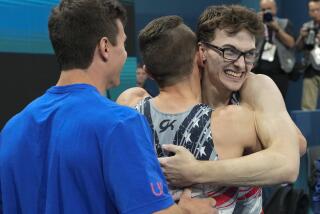Academic Decathlon Got Him on Track at Last
It may feel like a waste this morning . . . those thousands of hours they spent reading classic literature, boning up on calculus, studying the workings of the brain, in a futile effort to defend El Camino High’s state title in the academic decathlon.
But UCLA student Robert Magee has a few words of consolation for the whiz kids at his alma mater, who wound up second last weekend in the state’s annual battle of the brains.
Nevermind the winners’ gold medals, scholarships, acclaim. There are less tangible, but more enduring prizes . . . long-term dividends even losers gain.
At the least, the challenge of competition “drives you to work your hardest, do your best, and you come away feeling good about what you’ve done.”
And if you are--as Robert once was--flirting with academic failure, the contest can provide the rebirth you need.
Robert was on El Camino’s team when the school swept the state contest two years ago. A perennial decathlon powerhouse, the school surprised no one with its victory.
But Robert stunned the competition by walking off with its top honors, racking up more points than any of the 400 decathletes.
It was the triumph of the classic underachiever, a victory over dean’s-list kids and straight-A students by a shy and unlikely scholar, whose report card was littered with Cs.
*
It is the beauty of the academic decathlon that every school’s nine-member team must include three squads--one each for A, B and C students.
In local, state and national competitions, schools vie for team and individual honors in 10 categories from science to fine arts, literature to economics. They put in months of preparation, with daily study marathons that obliterate outside interests. No more music lessons, television, comic books, basketball. . . .
For confirmed brainiacs, the trade-off may be easy. The decathlon is one more chance to show what they know, to gild an already golden resume. But for kids like Robert, it is both a challenge and a risk--a chance to either rise above shoddy school performance, or confirm the lack of intellectual rigor that the grades on the report card indicate.
Robert hadn’t always been a mediocre student. He did well in middle school and earned straight A’s in the ninth grade, but he began to lose interest in his studies and was barely hanging on to a C average by the time he hit junior year.
The son of a nurse and a rocket scientist, Robert is “a natural genius,” says his former English teacher, Sharon Markenson. “One of those kids who retains everything he reads.” But like many gifted students, he was unmotivated, bored by school’s tedium and routine.
“He sat in the back of the class, he never spoke, he never took notes,” Markenson recalls. “And still, he wound up setting the curve for every test. He knew the stuff. But he wouldn’t do the grunt work . . . wouldn’t turn in homework, wouldn’t write the papers.”
She could have given him a failing grade, but she tossed him a lifeline instead.
“With students like Robert, the system fails,” she explains. “We don’t have much to offer them. What he needed was a challenge to inspire him to reach his potential.”
It took her two years, but Markenson convinced him to join the school’s decathlon team. By then, the start of his senior year, his marks had dipped so low that he was embarrassed to show them to people.
Decathlon training--with its daily six-hour study sessions requiring obsessive concentration--was like boot camp for his brain.
“It got me back on track,” he says. “Helped me with my study skills, taught me discipline, showed me the value of hard work.”
It became not only his academic salvation, but a key to personal success as well.
“I have drive now,” he says, “that I never had before.”
Despite his good grades early on, he had never considered himself a scholar until he outscored California’s smartest kids in the decathlon competition.
“It felt really good,” he says, “to be recognized for scholastic achievement. And for the hard work it took to get to that day.”
*
It wasn’t easy to convince college officials that the student reflected by his high school transcripts wasn’t the real Robert Magee.
Because of his Cs and Ds, he was rejected by UCLA--even though he’d gone on to earn straight A’s in the 12th grade and scored 1500 on his SAT.
But he appealed and was admitted on the strength of his senior-year record, recommendations from teachers and his performance as a decathlete. “I showed them the effort I’d made, how far I’d come, how I’d turned everything around.”
Today, Robert is a college sophomore, majoring in electrical engineering. He’s made the dean’s honor roll every quarter and is an officer in the Honor Society. In his spare time, he tutors kids and runs his own house-painting business.
It hasn’t been an easy climb from academic mediocrity to the top of the scholastic heap.
But I’ll bet somewhere among those kids in Stockton last weekend there were other Robert Magees . . . reinventing themselves as scholars, given a venue and a push to succeed.
Sandy Banks’ column is published on Sundays and Tuesdays. Her e-mail address is [email protected].
More to Read
Sign up for Essential California
The most important California stories and recommendations in your inbox every morning.
You may occasionally receive promotional content from the Los Angeles Times.










